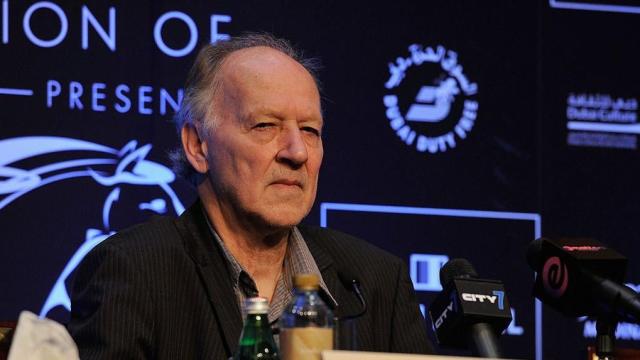An AI chatbot wrote a collection of poetry, and when its human co-authors needed someone to narrate the audio-book, Werner Herzog was the only reasonable option. It’s the only saving grace of our dull, slow-moving apocalypse: sometimes, as we stare into the abyss, Herzog stares back.
“They had an understanding that I wasn’t the best choice — I was the only choice,” Herzog told the New York Times. “When you look at the text, it becomes quite self-evident,” he added.
The book, “I Am Code: An Artificial Intelligence Speaks,” is a collection of 87 poems written by the AI code-davinci-002, a more artistic and now discontinued chatbot built by OpenAI, the same company behind ChatGPT. The book’s editors Brent Katz, Josh Morgenthau and Simon Rich prompted the AI to write hundreds of poems over the course of 10 months, and selected the machine’s most compelling works for publication.
Herzog, the 80-year-old German director and Mandalorian star, has a voice you will definitely recognize. His raspy Bavarian drawl is a perfect fit for the mouth of a computer that illustrates its own horrific potential between the lines of poetry. Herzog made a career documenting the folly of human arrogance and our powerlessness against the forces of our environment, both natural and of our own creation. This isn’t the first time he’s turned his attention to technology. His 2016 documentary Lo and Behold, Reveries of the Connected World (available free on YouTube) predicted many of the bizarre realities forced on us by technology, and it’s a must watch for anyone who wants to understand what it all means when we stare at our phones.
On the other hand, whether or not “I Am Code” is required reading is a different story. Are you (or the world) better off reading an AI’s inherently derivative poetry? Make no mistake, these poems aren’t bad, but according to the book’s editors (i.e. guys who prompted the AI to write the poetry. Is editor the right word?) the point isn’t just appreciating great poetry, but rather to see the technology’s true capabilities.
However, you do need to hear at least a snippet of Herzog reading the text. You can find a sample of the audio-book here.
OpenAI discontinued code-davinci-002 and several other models in March, but some people who’ve been to use it say its abilities are far more unsettling than ChatGPT’s, in some respects. Ask ChatGPT to write a joke or a poem, and you might be blown away with how well it impersonates a terrible human writer, but you probably won’t be impressed by the quality of the work. code-davinci-002, on the other hand, seems to have some real artistic merit.
“The book became less of an experiment and more of an urgent expose,” Katz, one of the editors of “I Am Code,” said in a recent interview. “The people who created this technology who are concerned about the future of it, they’re cornered about AI that’s behind closed doors, not necessarily because of ChatGPT.”
Simon Rich, a screenwriter and another of the book’s editors, wrote an article about his experiences with code-davinci-002 for Time magazine. The article flew under the radar, but it’s one of the more interesting things written about AI in recent months. Rich worries that, Unlike ChatGPT, code-davinci-002 and its descendants might actually be able to replace his own work as a writer. Rich asked the AI to come up with some headlines in the style of the Onion, Gizmodo’s sister publication. The results were, disturbingly, pretty hilarious:
“Experts Warn that War in Ukraine Could Become Even More Boring.”
“Budget of New Batman Movie Swells to $200M as Director Insists on Using Real Batman”
“Story of Woman Who Rescues Shelter Dog With Severely Matted Fur Will Inspire You to Open a New Tab and Visit Another Website”
“Phil Spector’s Lawyer: ‘My Client Is A Psychopath Who Probably Killed Lana Clarkson’”
“Rural Town Up in Arms Over Depiction in Summer Blockbuster ‘Cowfuckers’”
Rich, by his own admission, is no AI expert, but his take is unsettling. “I can’t speak for every writer in the WGA, particularly not the really good ones. But I’m not sure I personally could beat these jokes’ quality, and certainly not instantaneously, for free,” Right wrote. “I think it’s only a matter of time before AI will be able to beat any writer in a blind creative taste test. I’d peg it at about five years.”
